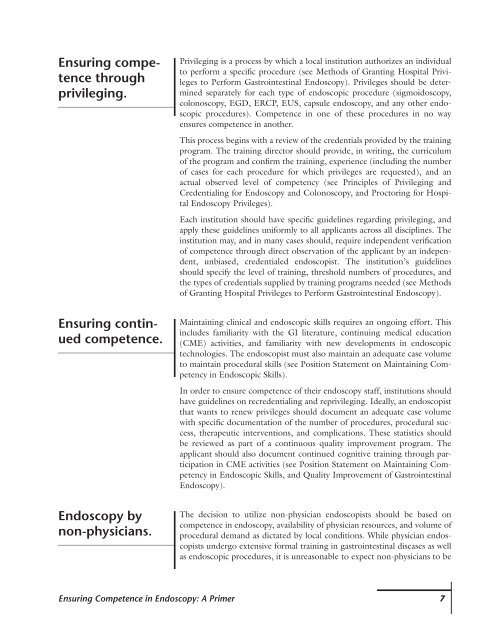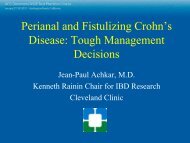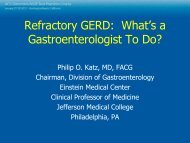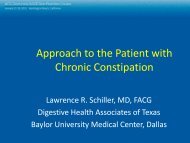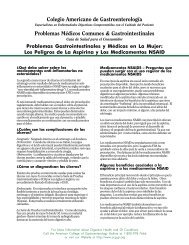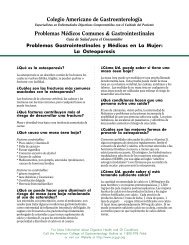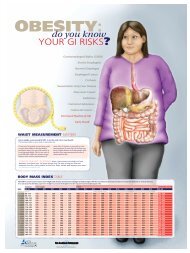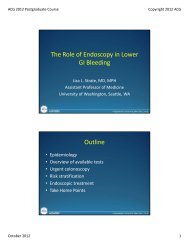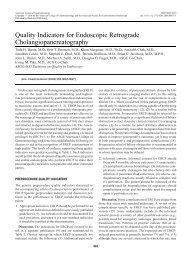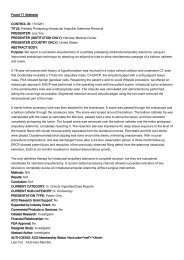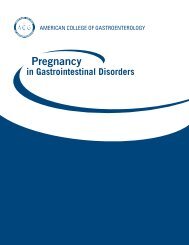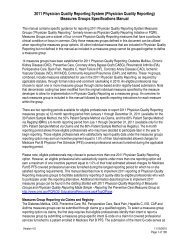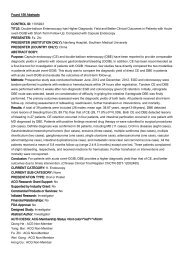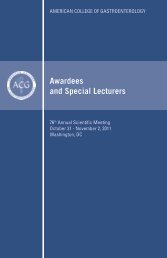Ensuring Competence in Endoscopy - American College of ...
Ensuring Competence in Endoscopy - American College of ...
Ensuring Competence in Endoscopy - American College of ...
You also want an ePaper? Increase the reach of your titles
YUMPU automatically turns print PDFs into web optimized ePapers that Google loves.
<strong>Ensur<strong>in</strong>g</strong> competence<br />
through<br />
privileg<strong>in</strong>g.<br />
<strong>Ensur<strong>in</strong>g</strong> cont<strong>in</strong>ued<br />
competence.<br />
<strong>Endoscopy</strong> by<br />
non-physicians.<br />
Privileg<strong>in</strong>g is a process by which a local <strong>in</strong>stitution authorizes an <strong>in</strong>dividual<br />
to perform a specific procedure (see Methods <strong>of</strong> Grant<strong>in</strong>g Hospital Privileges<br />
to Perform Gastro<strong>in</strong>test<strong>in</strong>al <strong>Endoscopy</strong>). Privileges should be determ<strong>in</strong>ed<br />
separately for each type <strong>of</strong> endoscopic procedure (sigmoidoscopy,<br />
colonoscopy, EGD, ERCP, EUS, capsule endoscopy, and any other endoscopic<br />
procedures). <strong>Competence</strong> <strong>in</strong> one <strong>of</strong> these procedures <strong>in</strong> no way<br />
ensures competence <strong>in</strong> another.<br />
This process beg<strong>in</strong>s with a review <strong>of</strong> the credentials provided by the tra<strong>in</strong><strong>in</strong>g<br />
program. The tra<strong>in</strong><strong>in</strong>g director should provide, <strong>in</strong> writ<strong>in</strong>g, the curriculum<br />
<strong>of</strong> the program and confirm the tra<strong>in</strong><strong>in</strong>g, experience (<strong>in</strong>clud<strong>in</strong>g the number<br />
<strong>of</strong> cases for each procedure for which privileges are requested), and an<br />
actual observed level <strong>of</strong> competency (see Pr<strong>in</strong>ciples <strong>of</strong> Privileg<strong>in</strong>g and<br />
Credential<strong>in</strong>g for <strong>Endoscopy</strong> and Colonoscopy, and Proctor<strong>in</strong>g for Hospital<br />
<strong>Endoscopy</strong> Privileges).<br />
Each <strong>in</strong>stitution should have specific guidel<strong>in</strong>es regard<strong>in</strong>g privileg<strong>in</strong>g, and<br />
apply these guidel<strong>in</strong>es uniformly to all applicants across all discipl<strong>in</strong>es. The<br />
<strong>in</strong>stitution may, and <strong>in</strong> many cases should, require <strong>in</strong>dependent verification<br />
<strong>of</strong> competence through direct observation <strong>of</strong> the applicant by an <strong>in</strong>dependent,<br />
unbiased, credentialed endoscopist. The <strong>in</strong>stitution’s guidel<strong>in</strong>es<br />
should specify the level <strong>of</strong> tra<strong>in</strong><strong>in</strong>g, threshold numbers <strong>of</strong> procedures, and<br />
the types <strong>of</strong> credentials supplied by tra<strong>in</strong><strong>in</strong>g programs needed (see Methods<br />
<strong>of</strong> Grant<strong>in</strong>g Hospital Privileges to Perform Gastro<strong>in</strong>test<strong>in</strong>al <strong>Endoscopy</strong>).<br />
Ma<strong>in</strong>ta<strong>in</strong><strong>in</strong>g cl<strong>in</strong>ical and endoscopic skills requires an ongo<strong>in</strong>g effort. This<br />
<strong>in</strong>cludes familiarity with the GI literature, cont<strong>in</strong>u<strong>in</strong>g medical education<br />
(CME) activities, and familiarity with new developments <strong>in</strong> endoscopic<br />
technologies. The endoscopist must also ma<strong>in</strong>ta<strong>in</strong> an adequate case volume<br />
to ma<strong>in</strong>ta<strong>in</strong> procedural skills (see Position Statement on Ma<strong>in</strong>ta<strong>in</strong><strong>in</strong>g Competency<br />
<strong>in</strong> Endoscopic Skills).<br />
In order to ensure competence <strong>of</strong> their endoscopy staff, <strong>in</strong>stitutions should<br />
have guidel<strong>in</strong>es on recredential<strong>in</strong>g and reprivileg<strong>in</strong>g. Ideally, an endoscopist<br />
that wants to renew privileges should document an adequate case volume<br />
with specific documentation <strong>of</strong> the number <strong>of</strong> procedures, procedural success,<br />
therapeutic <strong>in</strong>terventions, and complications. These statistics should<br />
be reviewed as part <strong>of</strong> a cont<strong>in</strong>uous quality improvement program. The<br />
applicant should also document cont<strong>in</strong>ued cognitive tra<strong>in</strong><strong>in</strong>g through participation<br />
<strong>in</strong> CME activities (see Position Statement on Ma<strong>in</strong>ta<strong>in</strong><strong>in</strong>g Competency<br />
<strong>in</strong> Endoscopic Skills, and Quality Improvement <strong>of</strong> Gastro<strong>in</strong>test<strong>in</strong>al<br />
<strong>Endoscopy</strong>).<br />
The decision to utilize non-physician endoscopists should be based on<br />
competence <strong>in</strong> endoscopy, availability <strong>of</strong> physician resources, and volume <strong>of</strong><br />
procedural demand as dictated by local conditions. While physician endoscopists<br />
undergo extensive formal tra<strong>in</strong><strong>in</strong>g <strong>in</strong> gastro<strong>in</strong>test<strong>in</strong>al diseases as well<br />
as endoscopic procedures, it is unreasonable to expect non-physicians to be<br />
<strong>Ensur<strong>in</strong>g</strong> <strong>Competence</strong> <strong>in</strong> <strong>Endoscopy</strong>: A Primer 7


